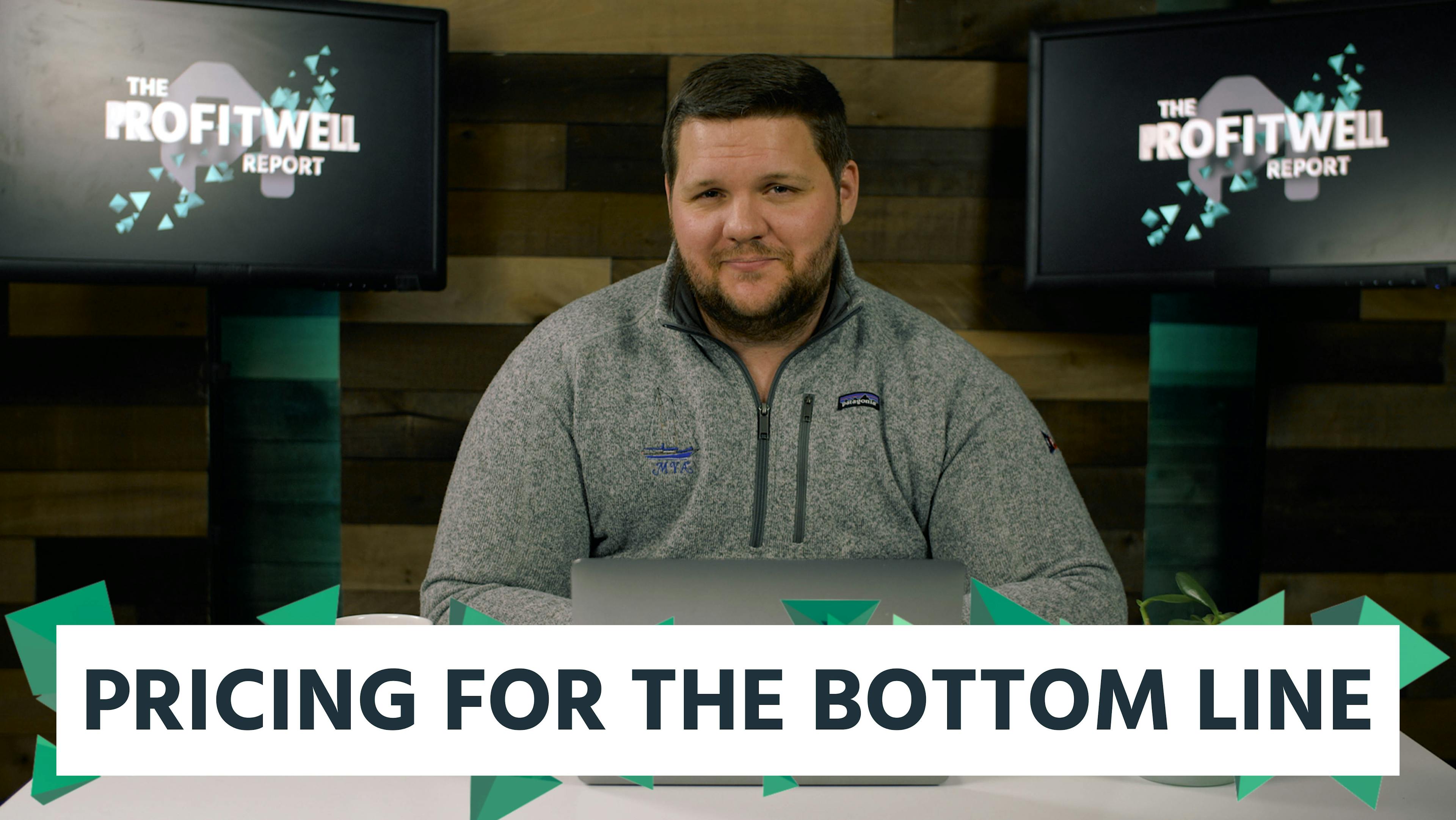
How To: Burn the Churn
This episode might reference ProfitWell and ProfitWell Recur, which following the acquisition by Paddle is now Paddle Studios. Some information may be out of date.
Originally published: April 3rd, 2019
Churn is a fact of life in the subscription game, but the beauty of the subscription model is that for the first time in the history of business, the relationship is baked right into how we make money. If a customer no longer sees the value in what we’re providing, they can easily cancel when the term comes up for renewal.
Yet, just because churn is a fact of life, doesn’t mean we can’t optimize for tactics that reduce churn considerably. Lets get to the data we gathered.
But first, if you like this kind of content and want to learn more, subscribe to get in the know when we release new episodes.

First up, the number one thing a lot of us need to attack yesterday is our failed payments.
Credit cards are mechanical devices subject to failure and delinquencies. Failed credit cards account for 20 to 40% of your churn when looking at both B2B and B2C companies. Note that as you get larger, the proportion of your churn that comes from delinquencies actually increases.
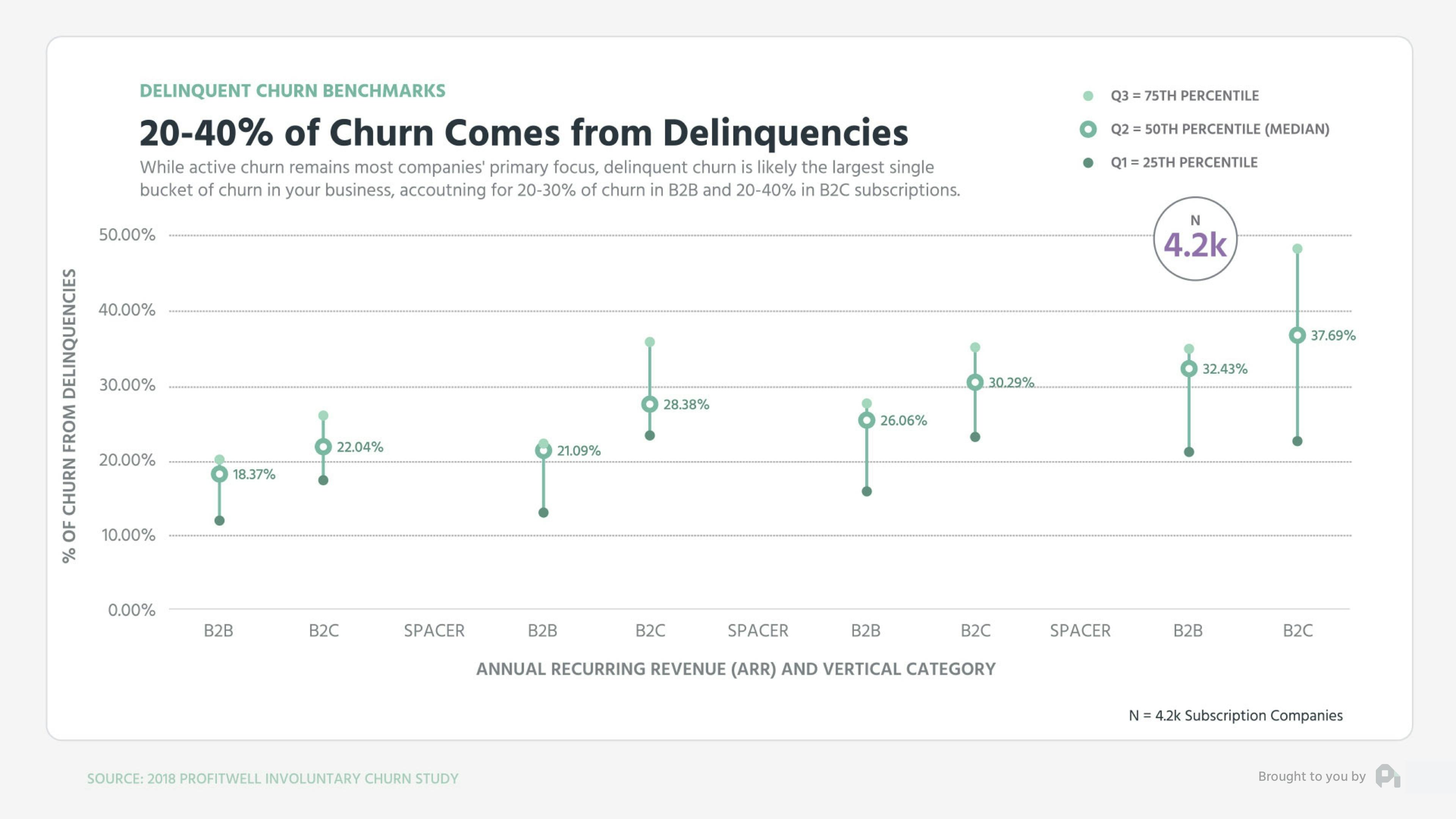
This is likely because you’re getting a bit better at regular churn, but also because you don’t get economies of scale with more credit cards.
To make matters worse, we’re actually pretty bad at recovering these failed payments.
No matter the size of the company, we’re recovering only around 30% of those individuals that have a failed payment.
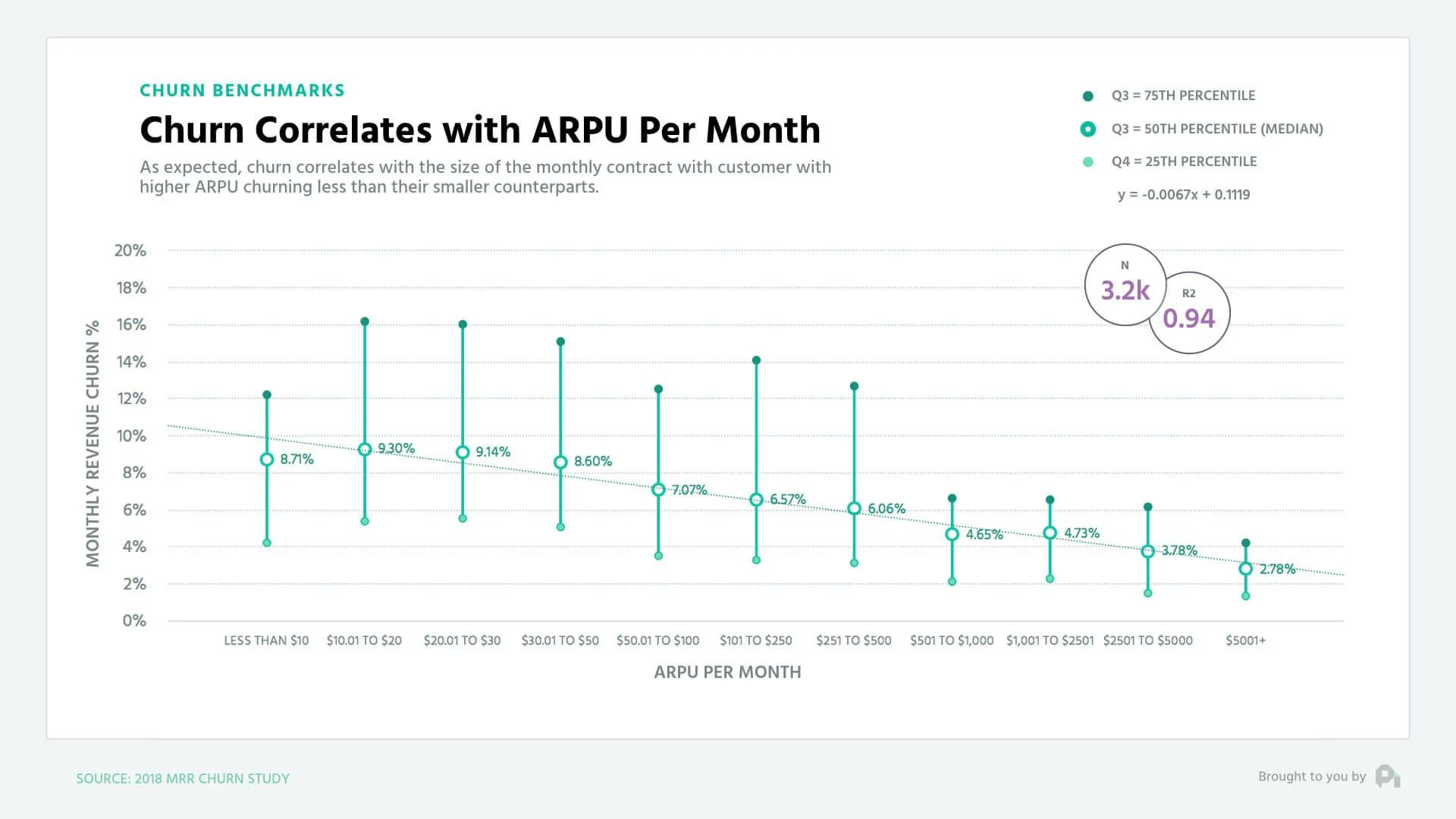
To put it another way - for every 10 people who have a payment failure, you’re only recovering 3, leaving 7 to basically be flushed down the tubes.
After fixing up your delinquencies, I’d start to optimize annual payments. As the data indicates, those companies with more annual customers see lower churn, sometimes 5x lower, mainly because these customers have one purchasing decision per year versus 12 per year.
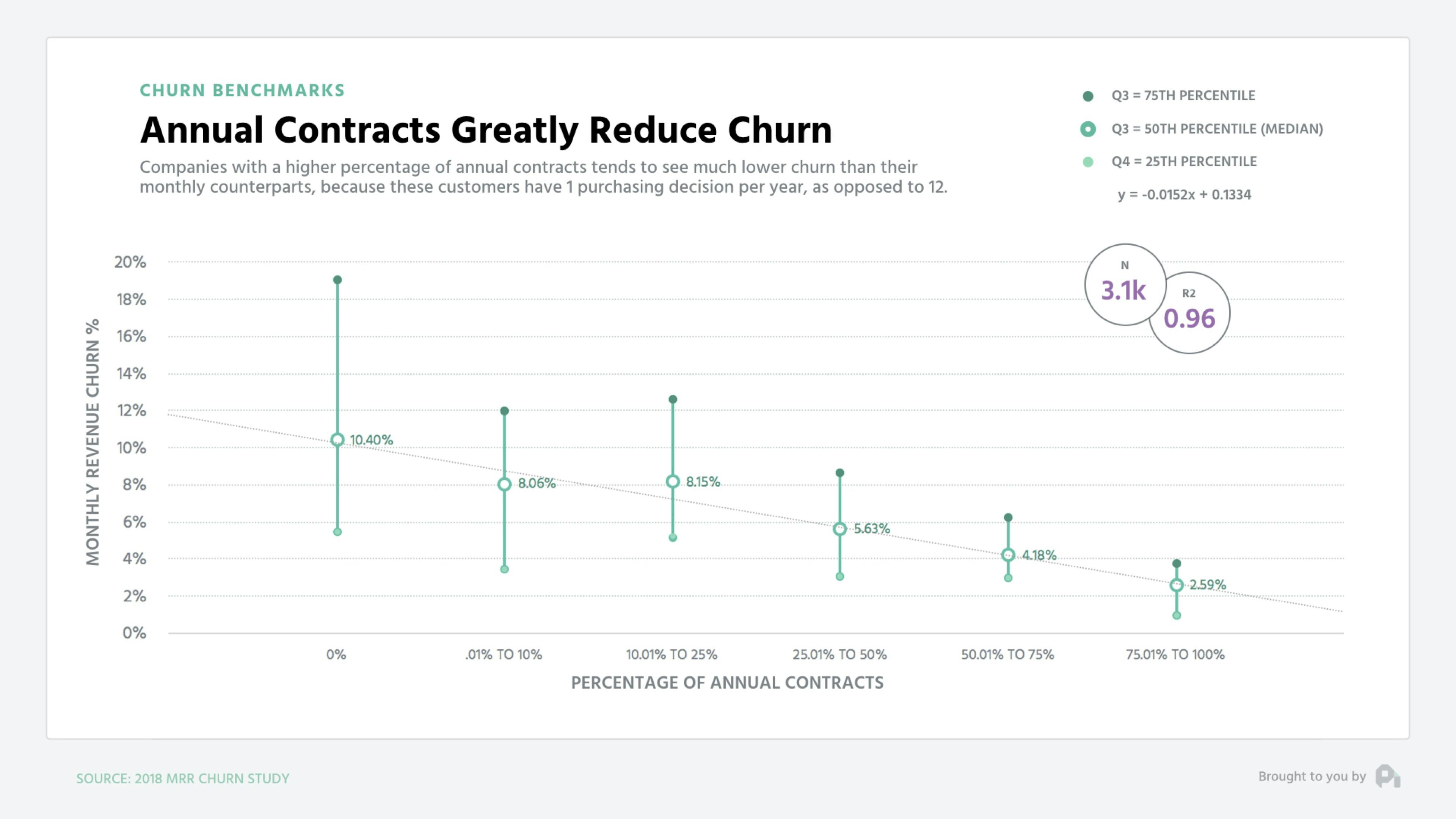
This obviously won’t hack your way out of not having a great product, but it certainly will help if you already have the right foundation.
Next is a bit more difficult to implement, meaning it’s not a quick fix, but one of the highest impact shifts you can make is utilizing a value metric in your pricing strategy. A value metric is what you charge for - per user, per 100 visits, per 1,000 videos - could be a whole host of things.
Those companies utilizing a value metric tend to see half the gross churn of their feature differentiated counterparts.
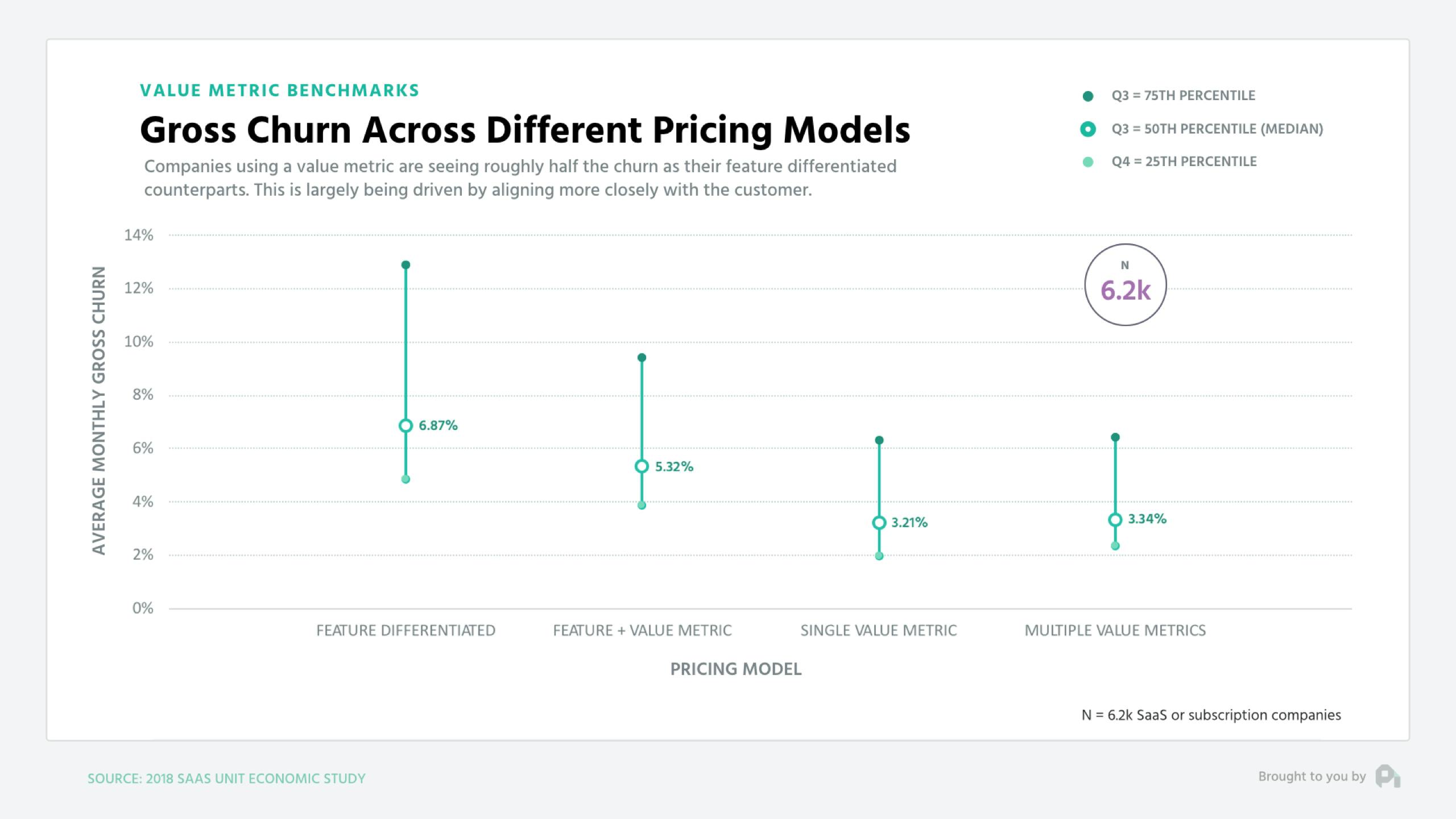
This is mainly because with a value metric your users are paying for what they’re using and presumably if they’re using more, they’ll pay more. If they’re using less, they’ll pay less. Most importantly though, they’re paying for the value they’re receiving, so there isn’t a reason to churn.
Ultimately, your gross churn is an incredibly tricky problem to attack that no amount of tactics is going to solve. Yet, there are very mechanical pieces of churn and classic positioning strategies with value metrics and annuals that can help you stack the deck and compound the churn reduction value that your product team is already implementing.
Want to learn more? Check out our recent episode: Your Open Office Space May be Tainting Your Subscription Growth and subscribe to the show to get new episodes.

1
00:00:00,320 --> 00:00:03,520
You've got the questions,
and we have the data.
2
00:00:03,520 --> 00:00:06,620
This is the ProfitWell Report.
3
00:00:08,655 --> 00:00:12,575
This is Nathan Beckert, CEO of
founder suite dot com, and I
4
00:00:12,575 --> 00:00:15,310
wanna know what would
you do to combat churn.
5
00:00:15,310 --> 00:00:18,590
Welcome back, everyone. Neil
here for the profitable report.
6
00:00:18,590 --> 00:00:21,390
Churn is a fact of life
in the subscription game.
7
00:00:21,390 --> 00:00:23,870
But the beauty of the
subscription model is that for
8
00:00:23,870 --> 00:00:26,215
the first time in the
history of business,
9
00:00:26,215 --> 00:00:29,655
the relationship is baked
right into how we make money.
10
00:00:29,655 --> 00:00:32,860
If a customer no longer sees the
value of what we're providing,
11
00:00:41,685 --> 00:00:43,425
reduce churn considerably.
12
00:00:43,525 --> 00:00:45,205
So to answer this question,
13
00:00:45,205 --> 00:00:48,085
we're gonna go deep into the
data by studying just over
14
00:00:48,085 --> 00:00:50,430
eight thousand
subscription companies.
15
00:00:50,430 --> 00:00:54,190
First up, the number one thing a lot
of us need to attack yesterday is
16
00:00:54,190 --> 00:00:55,770
our failed payments.
17
00:00:55,870 --> 00:01:00,465
Credit cards are mechanical devices
subject to failure and delinquencies.
18
00:01:00,465 --> 00:01:03,585
Failed credit cards account for
twenty to forty percent of your
19
00:01:03,585 --> 00:01:07,645
churn when looking at both
b to b and b to c companies.
20
00:01:07,860 --> 00:01:09,380
Note that as you get larger,
21
00:01:09,380 --> 00:01:12,100
the proportion of your churn
that comes from delinquencies
22
00:01:12,100 --> 00:01:13,680
actually increases.
23
00:01:13,860 --> 00:01:16,905
This is likely because you're getting
a bit better at regular churn,
24
00:01:16,905 --> 00:01:20,825
but also because you don't get economies
of scale with more credit cards.
25
00:01:20,825 --> 00:01:21,945
To make matters worse,
26
00:01:21,945 --> 00:01:25,590
we're actually pretty bad at
recovering these failed payments.
27
00:01:25,590 --> 00:01:27,430
No matter the size
of the company,
28
00:01:27,430 --> 00:01:29,910
we're recovering only around
thirty percent of those
29
00:01:29,910 --> 00:01:32,310
individuals that have
had a failed payment.
30
00:01:32,310 --> 00:01:33,510
To put it another way,
31
00:01:33,510 --> 00:01:35,765
for every ten people who've
had a failed payment,
32
00:01:35,765 --> 00:01:37,845
you're only recovering three,
33
00:01:37,845 --> 00:01:41,265
leaving seven to be basically
flushed down the twos.
34
00:01:41,365 --> 00:01:43,050
After fixing up
your delinquencies,
35
00:01:43,050 --> 00:01:45,850
I'd start to optimize
for annual payments.
36
00:01:45,850 --> 00:01:47,290
As the data indicates,
37
00:01:47,290 --> 00:01:50,010
those companies with more
annual customers see lower
38
00:01:50,010 --> 00:01:52,975
churn, sometimes five
times lower churn,
39
00:01:52,975 --> 00:01:56,095
mainly because these customers
have one purchasing decision
40
00:01:56,095 --> 00:01:58,415
per year versus twelve per year.
41
00:01:58,415 --> 00:02:01,440
This obviously won't hack your way
out of not having a good product,
42
00:02:01,440 --> 00:02:05,180
but it'll certainly help if you
already have the right foundation.
43
00:02:05,360 --> 00:02:07,680
Next, it's a bit more
difficult to implement,
44
00:02:07,680 --> 00:02:09,485
meaning it's not a quick fix,
45
00:02:09,485 --> 00:02:12,765
but one of the highest
impact shifts you can make is
46
00:02:12,765 --> 00:02:15,965
utilizing a value metric
in your pricing strategy.
47
00:02:15,965 --> 00:02:18,170
A value metric is
what you charge for.
48
00:02:18,170 --> 00:02:21,450
Per user, per thousand visits,
per one hundred videos,
49
00:02:21,450 --> 00:02:22,810
could be a whole host of things.
50
00:02:22,810 --> 00:02:23,530
Right?
51
00:02:23,530 --> 00:02:26,890
Those companies utilizing a
value metric tend to see half
52
00:02:26,890 --> 00:02:30,075
the gross churn of their feature
differentiated counterparts.
53
00:02:30,075 --> 00:02:32,315
This is mainly because
with the value metric,
54
00:02:32,315 --> 00:02:34,395
your users are paying
for what they're using.
55
00:02:34,395 --> 00:02:37,210
And, presumably, if they're
using more, they'll pay more.
56
00:02:37,210 --> 00:02:39,450
If they're using less,
they'll pay less.
57
00:02:39,450 --> 00:02:40,570
Most importantly, though,
58
00:02:40,570 --> 00:02:42,810
they're paying for the
value they're receiving,
59
00:02:42,810 --> 00:02:45,245
so there isn't a
reason to churn at all.
60
00:02:45,245 --> 00:02:49,485
Ultimately, your gross churn is
incredibly tricky problem to attack that
61
00:02:49,485 --> 00:02:51,645
no amount of tactics
is gonna solve.
62
00:02:51,645 --> 00:02:54,390
Yet, they're very mechanical
pieces of churn and classic
63
00:02:54,390 --> 00:02:57,430
positioning strategies with
value metrics and annuals that
64
00:02:57,430 --> 00:03:00,230
can help stack the deck and
compound the churn reduction
65
00:03:00,230 --> 00:03:03,095
value that your product team
has already implemented.
66
00:03:03,095 --> 00:03:04,695
Well, that's all for now.
67
00:03:04,695 --> 00:03:05,575
If you have a question,
68
00:03:05,575 --> 00:03:08,375
send me an email or video to
neil at profitable dot com.
69
00:03:08,375 --> 00:03:11,900
And as always, if you got value
out of this report or any others,
70
00:03:11,900 --> 00:03:14,940
we'd appreciate any shares on
Twitter and LinkedIn because
71
00:03:14,940 --> 00:03:16,865
that's how we know
to keep doing this.
72
00:03:16,865 --> 00:03:20,845
I will see you next week.
73
00:03:20,945 --> 00:03:23,665
This week's episode is
brought to you by Mixmax,
74
00:03:23,665 --> 00:03:27,073
powerful analytics automation
and enhancements for your
75
00:03:27,073 --> 00:03:28,733
outbound communications.
76
00:03:28,833 --> 00:03:30,973
Mixmax dot com.






